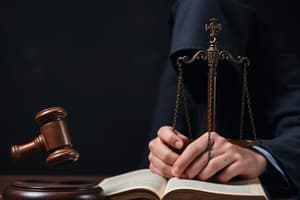Podcast
Questions and Answers
What is the primary factor that determines whether an act is considered a crime?
What is the primary factor that determines whether an act is considered a crime?
- The cultural and historical context of the act (correct)
- The objective moral standards of the society
- The severity of the harm caused by the act
- The economic impact of the act on the community
Who has the power to enact laws and define what is criminal?
Who has the power to enact laws and define what is criminal?
- The police force
- The legislature (correct)
- The executive
- The judiciary
What is the implication of globalization on the role of the State in defining what is criminal?
What is the implication of globalization on the role of the State in defining what is criminal?
- The State has more control over defining what is criminal
- The State's role in defining what is criminal becomes more objective
- The State's role in defining what is criminal remains unchanged
- The State has less control over defining what is criminal (correct)
What is the significance of considering crime as a social construction?
What is the significance of considering crime as a social construction?
What is the purpose of transnational concepts like terrorism and smuggling, according to Ruggiero (2003)?
What is the purpose of transnational concepts like terrorism and smuggling, according to Ruggiero (2003)?
What is the primary reason for the criminalization of smoking?
What is the primary reason for the criminalization of smoking?
What is the main challenge in criminalizing female genital mutilation?
What is the main challenge in criminalizing female genital mutilation?
What is the implication of crimes being social constructions?
What is the implication of crimes being social constructions?
What can be a limitation of the conventional idea of 'crime'?
What can be a limitation of the conventional idea of 'crime'?
What is an example of a behavior that can be legal but still cause harm?
What is an example of a behavior that can be legal but still cause harm?
Flashcards are hidden until you start studying




